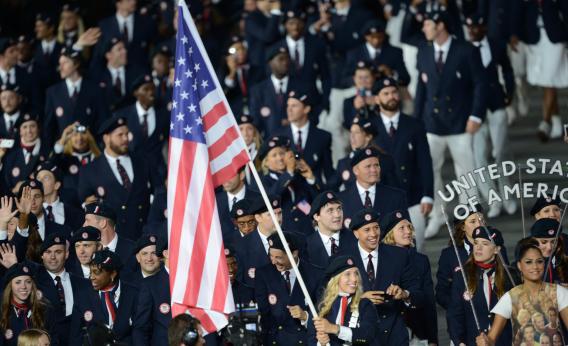It’s been a good run for Team USA, which as of this writing leads the medal count with 92. But the London Games have also emphasized how, for all our focus on U.S. Olympians for a couple of weeks every other year, Team USA is an artificial construct that has little to do with the Olympic athlete’s experiences and training.
The range of the journey-to-the-Olympics stories we get every year highlight just how different Olympians’ paths are in the years leading up to competition. Weightlifter Sarah Robles’ story highlighted the huge range of stipends available to athletes depending on their sports—she was living on $400 a week and food donations before public outcry helped her win an endorsement that helped fund the last stretch of her Olympic journey. We also learned that Colorado swimmer Missy Franklin’s family had spent $100,000 in a single year to finance her career, and would continue to turn down endorsement cash for her to preserve her collegiate eligibility—unless, as her father said, she was offered a deal so big she couldn’t possibly refuse it, quantifying that by saying, “I remember when Tiger signed for five years and $40 million. That’s a horrendous amount of money.” Gabby Douglas’ mother sold her jewelry to help keep her daughter in gynmastics, and earlier this year, filed for bankruptcy. This spring, CitiMortgage initiated foreclosure procedings on swimmer Ryan Lochte’s family, though his endorsements and prospective reality television career will presumably save the family home.
It’s not as if there aren’t financial disparities between individual professional athletes on the same team, too: It makes sense that veterans at the peak of their careers would make more than rookies. But the National Football League and Major League Baseball have minimum salaries in place that ensure that no one lives in poverty. There’s no such guaranteed financial support—and of course, none of the tight control of athletes’ lives that countries like China impose on their competitors—for American Olympians. They come into the games from very different places, and winning or losing may mean hugely different things to their financial futures. If Missy Franklin had a bad time in London, she’d go home to college and family financial stability, while Gabby Douglas’ successes may give her family security they didn’t have before.
With stakes like those, it’s no wonder that real bitterness sometimes springs up between competitors. American hurdler Dawn Harper has been sharply critical of the attention showered on her teammate Lolo Jones, saying, “I feel as if I had a pretty good story … not have a contract, working three jobs, living in a frat house, trying to make it work, coming off running in someone else’s shoes getting a gold medal.” Kelli Wells, who won bronze in the women’s 100-meter hurdles, said in the same interview that it was easy to congratulate Australian Sally Pearson, who won gold in their event, which makes sense. It’s not as if Pearson will take up space in the same media and endorsement market where Harper and Wells have to compete with Jones for attention and support.
And even when money isn’t at stake, the rivalries can be fierce, even nasty. “I saw somebody that has basically been asking to get beat for the longest time,” swimmer Tyler Clary said about Michael Phelps, words Phelps will presumably remember after the games that made him the most-decorated Olympian of all time. Lochte and Phelps had a friendlier rivalry going into the games—they play cards together—but that may be in part because their future plans lie in different spheres, Lochte’s in reality television, and if he gets his wishes, fashion design, while Phelps seems headed for a more sedate retirement.
But whatever the tensions, when they reveal themselves it’s a reminder that Team USA is a convenient fiction, an idea most of us embrace for a scant few weeks and then forget about, leaving a patchwork of organizations and private investments behind. It’s nice to imagine a united American front at the Games, but we spend the years in between them investing in the athletes and the sports that are there year in and year out, our real Teams USA wearing a hundred different uniforms and in perpetual conflict with each other.
